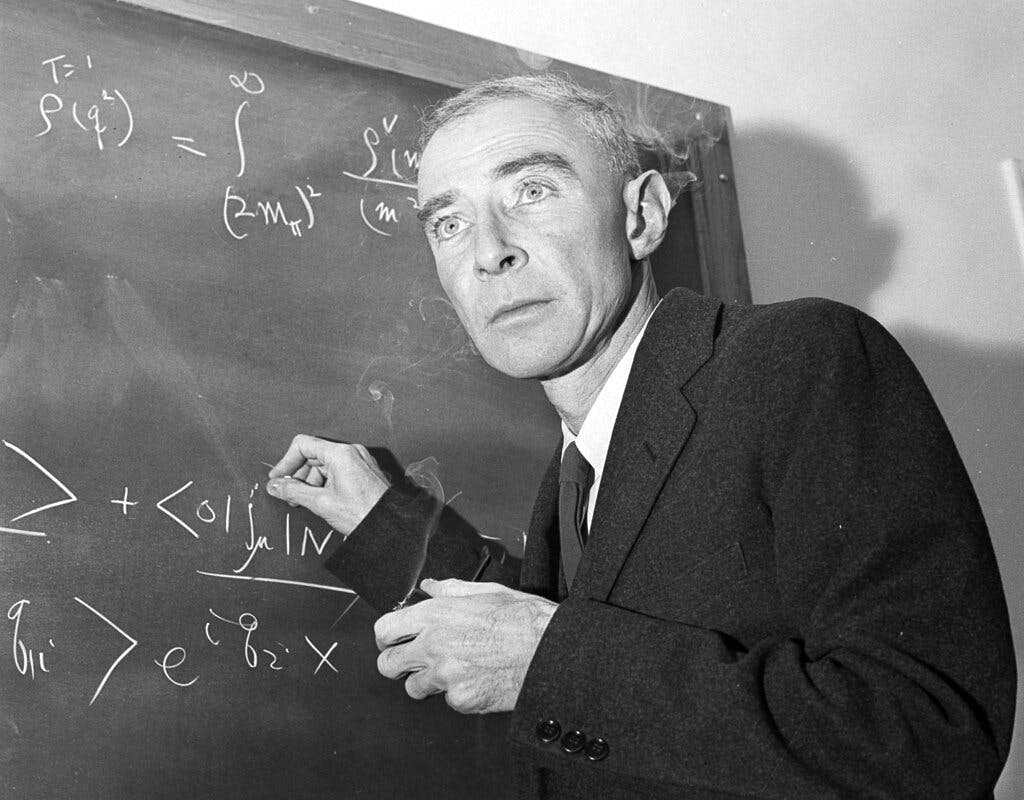Time To Open the Oppenheimer Files
A blockbuster biopic fails to answer the question of whether the father of the atom bomb was a member of the Communist Party.

The most spectacular thing about the movie “Oppenheimer” is that one of the world’s greatest film-makers spent $100 million making his masterpiece and still seems to be in the dark in respect of whether the “father of the A-bomb” was a member of the Communist Party. That, and the shocking decision of President Biden in January to restore the scientist’s security clearance posthumously, suggests it’s time for the government to come clean.
This was well put, we thought, by our columnist Dean Karayanis, when, last week, he issued his column on how to “decontaminate” Oppenheimer’s own record. After seeing the film, we put in a call to the historian Barton J. Bernstein, professor emeritus at Stanford. He’s spent more than a generation studying Oppenheimer. So we asked him whether the government is holding secrets of Oppenheimer that are yet to be disclosed.
“A very serious problem” is how Mr. Bernstein characterizes the matter. “Many key government documentary sources on J. Robert Oppenheimer remain closed in toto or in part,” he writes in an email. He cites, in particular, a few thousand pages of FBI files. The bureau has released some documents on Oppenheimer, but they are “partly and sometimes very substantially redacted,” with small or large chunks “blacked out.”
This, Mr. Bernstein reckons, is usually for “privacy” reasons (the emphasis is Mr. Bernstein’s). It means that “many specific contentions” in respect of Oppenheimer between about 1940 and 1958 remain “basically secret,” along with the “identity of who made those statements (whether unfavorable, or favorable).” Writes Mr. Bernstein: “Protecting privacy is an important civic value, and privacy should be respected — at least for the living.”
Then again, too, he writes, privacy, under the Freedom of Information Act “does not exist for dead people.” Yet, he writes, “because of the FBI’s flawed procedures, and often the lack of knowledge by the FBI’s declassification-reviewers, the identity of specific sources in documents — when the source is actually dead — is sometimes not revealed. It is still kept secret.” The FBI seems “often not to know who is dead and who is not.”
In the order restoring Oppenehimer’s clearance, the Energy Secretary, Jennifer Granholm, noted that she had the “responsibility to correct the historical record and honor Dr. Oppenheimer’s profound contributions.” Biographer Kai Bird maintains that “America’s most celebrated scientist” was “falsely accused and publicly humiliated.” Without the files, though, how can one know what’s false and whether history is being corrected, or obscured?
Mr. Bird sees Oppenheimer as a “victim of the McCarthy maelstrom” — a framework director Christopher Nolan adopts in making his film. This overlooks the concerns that prompted the loss of Oppenheimer’s security clearance. At the time, America was racing against Soviet Russia to develop a Hydrogen bomb. The physicist Edward Teller argued that Oppenheimer’s opposition to the H-bomb delayed its development by several years.
By that point, the Soviets had the new bomb, negating a potential strategic advantage for America as the Cold War gathered. In 1953, a former congressional aide, William Borden, an anti-McCarthy Democrat, advised the FBI that Oppenheimer was “more probably than not” an “agent of the Soviet Union.” Mr. Bernstein notes that the physicist, too, never came clean over “substantial evidence” that he’d been a member of the communist party.
Yet in Mr. Bird’s telling, Oppenheimer was “destroyed by a political movement characterized by rank know-nothing, anti-intellectual, xenophobic demagogues.” Mr. Bird argues the forces that brought down Oppenheimer embodied “a worldview proudly scornful of science.” Mr. Bird even draws a link between such villainy and President Trump, noting that McCarthy’s chief counsel, Roy Cohn, “taught” Mr. Trump his “wholly deranged style of politics.”
Mr. Bird says the “tragedy of Oppenheimer” has “damaged our ability as a society to debate honestly about scientific theory — the very foundation of our modern world.” That strikes us as vainglory. For the foundation of our modern world, better to look to Sinai. Forsooth the scientific method depends on transparency. To learn the truth of Oppenheimer’s life requires opening all the files that led officials to withdraw his security clearance in the first place.

